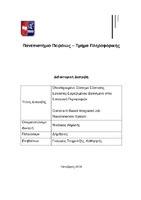Ολοκληρωμένο σύστημα σύστασης εργασίας - εργαζομένου βασισμένο στην εισαγωγή περιορισμών

Προβολή/
Λέξεις κλειδιά
Συστήματα συστάσεων ; Αναζήτηση εργασίας - εργαζομένου ; Αλγόριθμος σύστασης βασισμένος σε περιορισμούςΠερίληψη
Έκρηξη Πληροφοριών είναι ο όρος που χρησιμοποιείται για να δηλώσει την ταχεία αύξηση των διαθέσιμων πληροφοριών. Ο όρος αυτός, φαίνεται να περιγράφει με τον πλέον ακριβή τρόπο το πρόβλημα που αντιμετωπίζει η δικτυοκεντρική και προσανατολισμένη στου Η/Υ κοινωνία μας. Καθημερινά, βρισκόμαστε αντιμέτωποι με μια πληθώρα δεδομένων, προερχόμενη από διαφορετικές πηγές. Όσο αυξάνεται ο αριθμός των διαθέσιμων δεδομένων, οι προκλήσεις διαχείρισης γίνονται πολυπλοκότερες. Επιπλέον, η Πληροφοριακή Υπερπληθώρα είναι υπεύθυνη για τις λανθασμένες ή άστοχες αποφάσεις των τελικών χρηστών. Η ύπαρξη πολλών επιλογών είναι ένα από τα μεγαλύτερα επιτεύγματα της κοινωνίας μας, αλλά χωρίς καμία μορφή ελέγχου ή φιλτραρίσματος, αυξάνεται η δυσκολία σωστών επιλογών.
Προκειμένου να ξεπεραστεί το πρόβλημα της Πληροφοριακής Υπερπληθώρας, η επιστημονική κοινότητα στράφηκε στην βελτίωση των διαθέσιμων τεχνικών φιλτραρίσματος. Τα Συστήματα Σύστασης (Recommender Systems) αναπτύχθηκαν για να αντιμετωπίσουν τα προβλήματα και να μετριάσουν τις αντιξοότητες που υφίσταται η κοινωνία μας. Η αναζήτηση εργασίας είναι ένας τομέας που μαστίζεται από το φαινόμενο της Πληροφοριακής Υπερπληθώρας.
Στην παρούσα διατριβή αντιμετωπίζουμε το πρόβλημα της Πληροφοριακής Υπερπληθώρας στον τομέα της αναζήτησης εργασίας, μέσω του προτεινόμενου Συστήματος Σύστασης Εργασίας Βασισμένο σε Περιορισμούς. Αρχικά διατυπώνεται μαθηματικά το πρόβλημα της αναζήτησης εργασίας και στην συνέχεια παρουσιάζεται η αρχιτεκτονική σχεδίαση του συστήματος με τον προτεινόμενο Αλγόριθμο Σύστασης Τεσσάρων Διαστάσεων. Σύμφωνα με τον αλγόριθμο κάθε δεξιότητα μπορεί να εκφραστεί υπό την μορφή τεσσάρων περιοριστικών κατηγοριών: ακριβούς τιμής, με κάτω όριο, με άνω όριο και με άνω και κάτω όριο. Με την προσέγγιση αυτή υπολογίζουμε την καταλληλότητα του εργαζόμενου για μια θέση εργασίας και όχι απλά την ομοιότητα. Τέλος, το πλαίσιο της διατριβής ολοκληρώνεται μέσω συγκριτικών πειραμάτων με πραγματικά δεδομένα.


